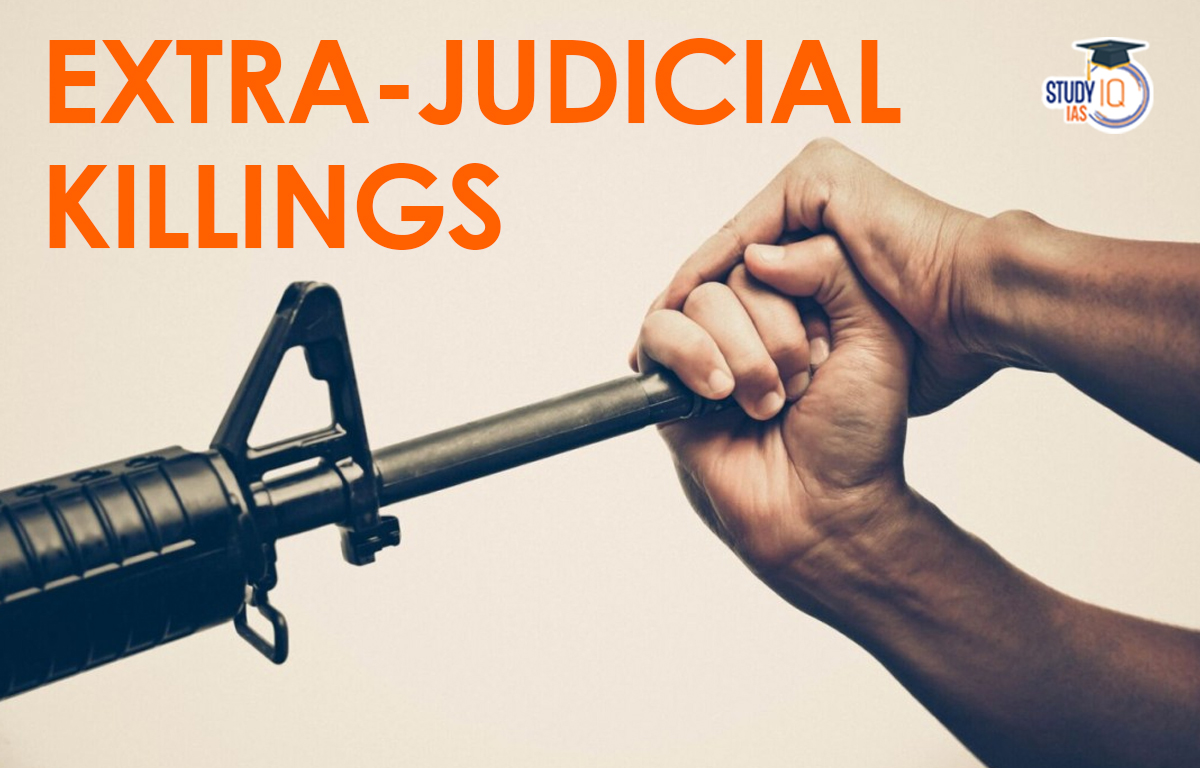Table of Contents
Context: With the recent extra judicial killing (aka encounter) of a gangster turned politician in UP, the misuse of power by the law enforcement agencies has come to the forefront.
What are Extra-Judicial Killings?
- Extra-judicial killings, popularly known as ‘encounters’ are those when the accused person is killed or executed illegally by the police officials before the judgement of the trial arrives.
- It can be said that the accused person in such cases is not even given a right to prove himself/ herself innocent before the court of law, which is illegal, as it violates basic human rights.
- The physical torture, sexual harassment, or mental torture of the accused by the police while the person is in custody also comes under the ambit of extra-judicial killings.
The Rising Trend of Extra-Judicial Killings in India
- India has registered 813 cases of encounter killings in the last six years, from 2016-’17 to 2021-’22.
- While there was a significant drop in these cases during the peak of the Covid-19 pandemic – from 112 in 2019-’20 to 82 in 2020-’21 – there was a 69.5% spike the next year with 139 cases.
- State-wise analysis:
- In the six years since April 2016, Chhattisgarh recorded the most extrajudicial killing cases at 259, followed by Uttar Pradesh at 110 and Assam with 79.
- Uttar Pradesh has seen more than a two-fold increase in extrajudicial killings in the last six years.
- The Uttar Pradesh Police, in their unofficial mission called “Operation Langda”, shot and injured more than 3,300 criminals in 8,472 encounters, leaving them with bullet wounds in legs
- In 2021-’22, Jammu and Kashmir with 38 has reported the most extrajudicial killing cases in India.

Legal Provisions Relating to Extra-Judicial Killings in India
- There are no direct provisions in the Indian legal system which authorize any official to kill an accused person without receiving an order from the legal authority.
- However, certain provisions are mentioned below which authorize an official to use force against a criminal.
- Section 100 of the IPC, 1860 authorizes every individual to exercise their right of private defence, which can include causing death if there is a reasonable fear of threat to one’s life.
- Section 46 of the Criminal Procedure Code (CrPC), 1973 allows the police officers to use any degree of force which is required to arrest the accused or prevent the accused from escaping.
- Section 4 of the Armed Forces (Special Powers) Act (AFSPA), 1958 authorizes officers to use force, including lethal force, against anyone believed to be breaking the law in a disturbed area if necessary, to maintain public order.
Rights Available to an Arrested Person
- Right to know the grounds of arrest in compliance with Section 50(1), Section 55 and Section 75 of CrPC, and Article 22(2) of the Indian Constitution.
- Right to information under Article 22 regarding the right to be released on bail.
- Right to remain silent as per Article 20(3) of the Constitution.
- Right to be presented before the Magistrate according to the provisions of Section 56 and Section 76 of CrPC.
- Right to a fair trial under Article 14 of the Constitution.
- Right to consult a legal practitioner as per the provisions of Section 50(3) of CrPC and Article 22(1) of the Constitution.
- The right to free legal aid to an indigent accused person is implicit in Article 21 of the Constitution.
Constitutionality of Extra-Judicial Killings
- Extra-judicial killings also serve as an attack on the fundamental rights of the citizens.
- The fundamental rights which are violated because of these unlawful killings are:
- Article 14- the right to equality.
- Article 21– the right to life and personal liberty except according to procedure established by law.
- Article 22– the right to be protected against arrest and detention.
Reasons Behind Extra-Judicial Killings
- Public support: Sometimes, the public supports these extra-judicial killings because they think that the court will not provide timely justice.
- Political support: Many political leaders believe that more encounters will serve as their achievement in maintaining law and order in the state.
- Rewards: The government provides various types of promotions and cash incentives to the officers who are involved in the execution of extra-judicial killings.
- Work pressure: The high pressure from the government instigates the police officials to treat the criminals brutally to extract information or confessions from them.
- Punitive violence: Many police officials believe that brutal torture of criminals creates fear in potential offenders and is necessary to control crime.
- Hero- worshipping: The officers executing these extra-judicial killings are considered heroes in society as the public thinks such killings to be the best way of cleaning up society.
- Inefficiency of police: Police lack resources for investigations, resulting in a low conviction rate. Encounters are an easy way for police to create a positive image of maintaining law and order.
Guidelines Related to Extra-Judicial Killings
Supreme Court Guidelines
- In the PUCL vs State of Maharashtra case (2014), the SC was dealing with writ petitions questioning the genuineness of 99 encounter killings by the Mumbai Police in which 135 alleged criminals were shot dead between 1995 and 1997.
- The Supreme Court then laid down the following 16-point guidelines as the standard procedure to be followed in the cases of death during police encounters. Some of which include:
- Record tip-off (intelligence) regarding criminal activities pertaining to the commission of a grave criminal offence.
- Registering FIR: If in pursuance to a tip-off, the police use firearms and this results in the death of a person, then an FIR initiating proper criminal investigation must be registered and be forwarded to the Court without any delay.
- Independent Probe: Investigation into such death must be done by an independent CID team or a police team of another police station under the supervision of a senior officer.
- Inform NHRC: The NHRC or State Human Rights Commission (as the case may be) must be immediately informed of the encounter death.
- Prompt Action: Amounting to an offence under the IPC, disciplinary action must be initiated against the police officer found guilty of wrongful encounter and for the time being that officer must be suspended.
- The Court directed that these requirements/norms must be strictly observed in all cases of death and grievous injury in police encounters by treating them as a law declared under Article 141 of the Indian Constitution.
NHRC Guidelines
- In March 1997, Justice M. N. Venkatachaliah (the then chairperson of the NHRC), asked all states and UTs to ensure that police follow the following set of guidelines in cases of encounter killings:
- Register FIR: When the in-charge of a Police Station receives information about the deaths in an encounter, he shall record that information in the appropriate register.
- Investigation: Received information shall be regarded as sufficient to suspect and immediate steps must be undertaken to investigate the relevant facts and circumstances leading to the death so as to ascertain, if any, offence was committed and by whom.
- Compensation: It can be granted to the dependents of the deceased when the police officers are prosecuted on the basis of the results of the investigation.
- Independent Agency: Whenever the police officers belonging to the same police station are the members of the encounter party, it is appropriate that the cases for investigation are referred to some other independent investigation agency, such as State CID.
- In 2010, NHRC extended these guidelines by including:
- Magisterial Probe: A magisterial enquiry must be held in all cases of death which occurs in the course of police action, as expeditiously as possible (preferably within three months).
- Reporting to Commission: All cases of deaths in police action in the states shall be preliminary reported to the Commission by the Senior Superintendent of Police/Superintendent of Police of the District within 48 hours of such death.
- A second report must be sent in all cases to the Commission within three months providing information like a post mortem report, findings
Way Forward
- Encounter killings must be thoroughly investigated to maintain the credibility of the rule of law.
- It is the state government’s duty to ensure adherence to the rule of law and train police officials to handle unforeseen situations and protect those in custody.
- Further, there is a dire need for complete overhauling of the criminal justice system and bringing out required police reforms.
- With the increasing number of encounter killings, there is a need to instill respect for human rights in officers involved.


 How African Reserves Eliminated Rhino Po...
How African Reserves Eliminated Rhino Po...
 Why India Needs Its Own Economic Model?
Why India Needs Its Own Economic Model?
 Challenges in India’s Airline Sector: ...
Challenges in India’s Airline Sector: ...

























